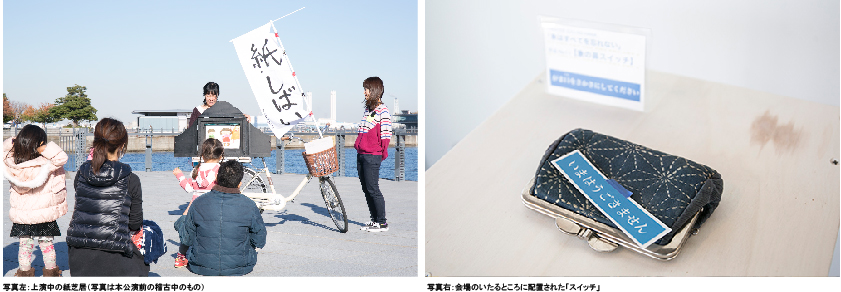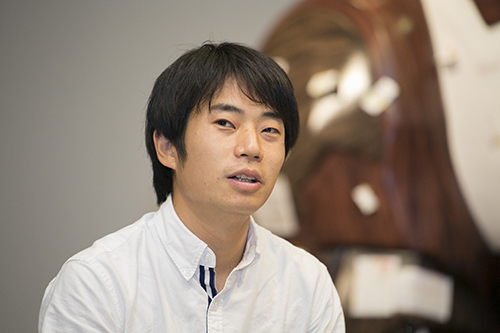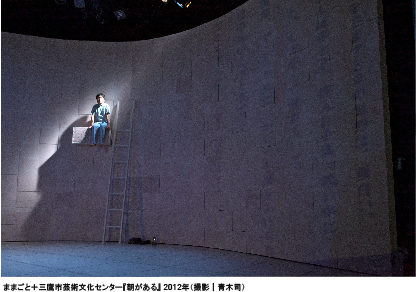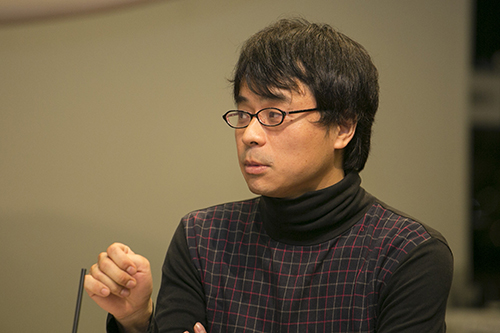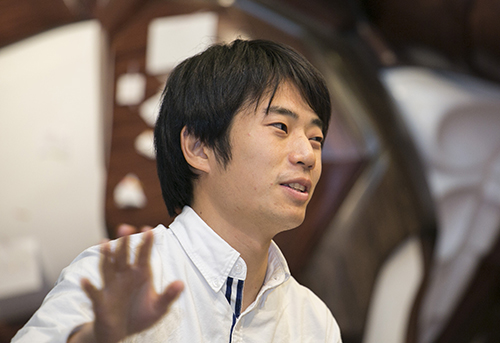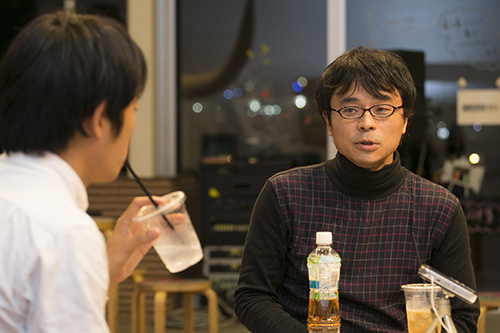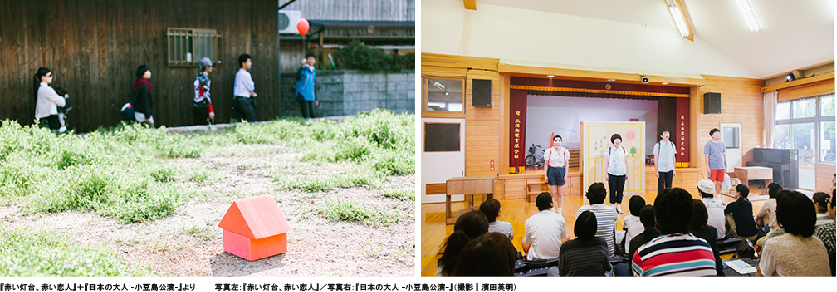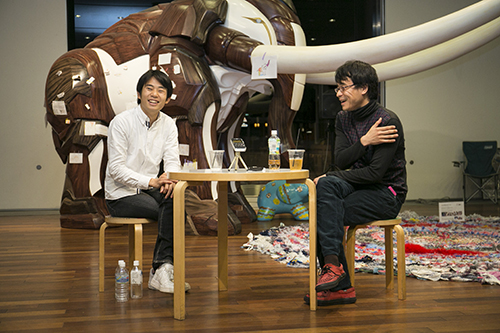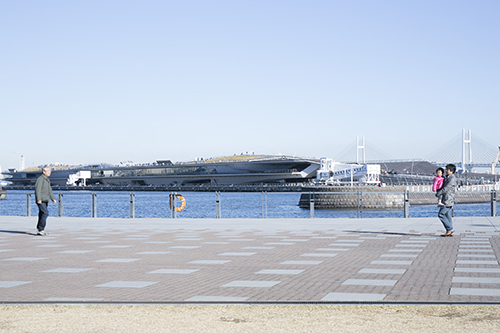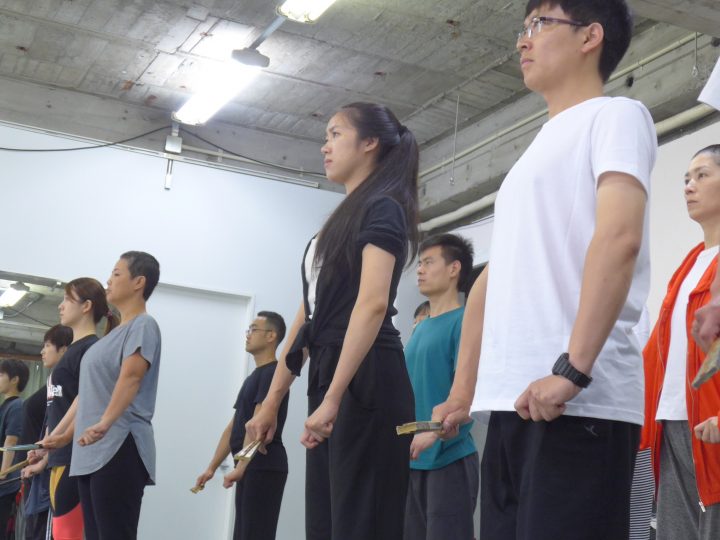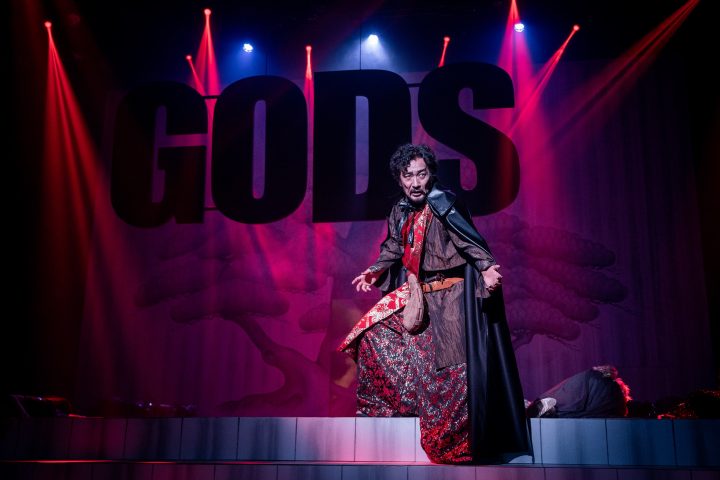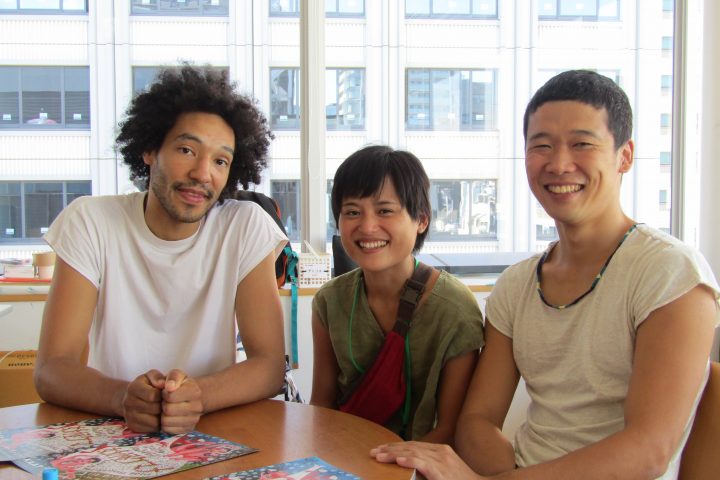Missing Out with Theatre: The Past, Present, and Future of Pretend Play
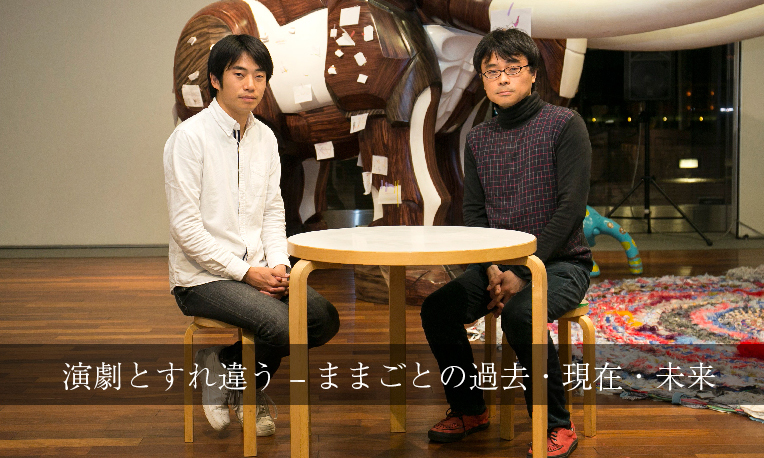
Shiba Yukio, the head of the theater company Mamagoto, is currently performing "Elephants Never Forget Everything" (Thursday, Friday, Saturday, and Sunday, December 1st to 15th, 2013) at the seaside Zo-no-hana Terrace in Yokohama. His style, which focuses on the beauty of structure like a mystery novel, came to fruition in "Our Planet" (2010), which boldly incorporated hip-hop, and won the 54th Kishida Kunio Drama Award. He dynamically updated the style of contemporary theater. He can be said to be a leader of the new generation, but at the same time, he seems to be deliberately keeping a certain distance from the Tokyo theater scene in recent years.
What is Shiba Yukio looking at now, and what is he trying to do? Here is an interview to hear about his past, present, and future.
Intervew&Text by Chikara Fujiwara
Photo by Masanobu Nishino
Cooperation: Zou-no-hana Terrace
Profile
Chikara Fujiwara
http://bricolaq.com/page/BricolaQ.html
Born in 1977. Editor and freelancer. Founder of personal media BricolaQ. Born in Kochi City, moved to Tokyo at the age of 12 and started living alone there. Moved around a lot after that, worked for a publishing company before going freelance. Edited magazines such as Ex-Po, Musashino Art University's newsletter mauleaf, and Setagaya Public Theater's CaroMag. Writes theater reviews under the name Pluthermal Fujiko. Judge for the CoRich Performing Arts Festival in 2012 and 2013. Co-edited with Tsujimoto Chikara, "Book Guide to Architecture" (Meigetsudo Shoten). Co-authored with Tokunaga Kyoko, "The Strongest Engeki Theory" (Asuka Shinsha). Currently lives in Yokohama.
Yukio Shiba
http://www.mamagoto.org/
Born in Aichi Prefecture in 1982. A member of the directing department of Seinendan. A resident artist at Steep Slope Studio.
While studying at Nihon University College of Art, he won the 2nd Sendai Theater Town Drama Award for "Dodomino." In 2010, he won the 54th Kishida Kunio Drama Award for "Our Star."
His plays carefully capture the subtleties of everyday life, and his direction incorporates ideas from outside the theater, such as looping and sampling. His plays depict a universal world from a new perspective, such as "Ayumi," a play in which the entire play is about walking, "My Star," a musical with rap, and "Repetition and Continuity," in which a one-man play is looped to play a large family.
He is actively involved in activities all over Japan, including participating in the Aichi Triennale and the Setouchi Triennale, directing community plays in Kani City, Gifu Prefecture, and directing at Iwaki Comprehensive High School in Fukushima Prefecture.
Between "There" and "Do"
Fujiwara : Today, I would like to ask Shiba Yukio and the Gekidan Mamagoto about the past, present, and future. Let's start with the "present," which is here at Zou-no-hana Terrace. This spring, Mamagoto created and presented several experimental works with various actors here, and in September they created a flash mob-like work with members they gathered through auditions. This time's "Elephants Never Forget Everything" will be a performance (?) born from that accumulation, and having seen the process so far, I thought it was very attractive, or rather, very open. How do you feel about it as someone involved?
Shiba : I thought it was a bit vague in the spring (laughs). I was consciously trying to make the beginning and the end vague, to try to eliminate the annoying feeling as much as possible.
Fujiwara : In the spring, the start time was also vague. It was like, "Well, shall we start soon?" (laughs). It was like there was no time frame.
Shiba : I stayed in Shodoshima for a long period this year (as an invited artist for the Setouchi Triennale ), and I was thinking about the relationship between "doing/being done" and the relationship between "being/seeing." Theater is born at the moment of "doing," and the audience is in a passive state of being "done." But here at Zou-no-hana Terrace, there are a lot of ordinary passers-by, so you end up doing it to people you don't want to be done to.
Fujiwara : It just gets you involved.
Shiba : That is an element that is inseparable from theater. But in art works and videos, like Perry the Elephant (a giant object created by Noboru Tsubaki ) here, the very existence of "being" is expressed. If you are interested in something that "is," you can look at it, and if you don't want to see it, you don't have to worry about it. I gradually began to wonder if I could create something mysterious that is somewhere between "being" and "doing."
Fujiwara : Maybe it's somewhere between an installation and a performance.
Shiba : At that time, we made sure to maintain the line of whether we would normally feel uncomfortable. Since it's not just me, but the feelings of the participating members are also important, we practice by asking the members, "What do you think?" and having them hit it back, and hitting it back, hitting it back... That's why we didn't take a top-down format this time.
Fujiwara : This time we've formed various teams and are working on each production separately.
Shiba : That's right. For example, there is a mechanism that activates a short performance called a switch, and there are also other works such as music, singing, radio, filming, picture-story shows... and even flash mobs. Then there is a mysterious team called design, who creates mechanisms that allow people who happen to come to the venue to leave something behind. There is also a tour. There is a lot going on (laughs).
Fujiwara : It would be impossible to control (laughs).
Shiba : I guess my job is arranging and structuring the content. The actors write all the scripts themselves, whether it's radio dramas, commercials, or news. Oh, there's even a commercial for Zou-no-hana Cafe's soft serve ice cream (laughs).
Different from theater
Fujiwara : The soft serve ice cream here is delicious. ...Well, in a normal theater, you first turn off your cell phone and sit down, and that sort of etiquette is shared, but here, there's no such rule. There will be a lot of kids on the weekends, and they'll probably be pressing that switch a lot (laughs).
Shiba : Even in Shodoshima, where there are many unspecified elements in the place and time, it is impossible to expect everything to go well by assuming the "process," so I said that I wanted each individual work to clear each moment and "result." For example, this time, I thought that the judgement of what to do when a child repeatedly presses the switch would be impossible unless each member had an artist's personality in the work and in their own body. Otherwise, when something happens that we didn't instruct, we won't be able to do anything.
Fujiwara : Now that I think about it, on the first day when we gathered together as current members, we talked about how we wanted each of us to be aware that we are a work of art and an artist. That seems quite surprising given the nature of Shiba Yukio as an artist in the past. After all, Shiba-kun was a very perfectionist and controlling type. I wonder when his attitude changed.
Shiba : Since the beginning of this year, I've wanted to work as a playwright, creating plays on paper. Until then, I'd been using my brain as a director to control time and space and say, "This is my play." But at Zou-no-hana Terrace, it's impossible to control the whole thing in the first place, and I thought it wouldn't be interesting to present a work in the same way as at a theater.
Fujiwara : Is that where the concept of "missing theater" came from?
Shiba : If you try to show the audience a "work" from start to finish using your usual theatrical brain, it's the same as confining it to a wall, so the element of coincidence is greatly reduced. This time, I want to get away from the "do/be done" relationship and make it something that "passes by." People who happen to come by can just stop by and then disappear, or they can just look at it for a while. That's why I wanted to do something that would work even if they only saw it for a moment.
A shift in thinking about "dramas"
Fujiwara : On the other hand, I wonder if your awareness as a playwright is also changing.
Shiba : That's right. Recently I've been conscious of not deviating too much from human time...
Fujiwara : Human time?
Shiba : For example, if it's one hour, the time inside the play and the time outside are the same. In the past, whether it was "Ayumi" or "Our Star," I often tried to share and empathize by expanding and contracting the time and enveloping it all at once, but that makes people symbolic. I think that approach suits my qualities. But I thought back to the fact that plays have the effect of moving the hearts of people of a wide range of generations and regions through personal experiences and emotions.
Fujiwara : In an interview for"The Strongest Engeki Theory" (Asuka Shinsha) , you said that you wanted to aim for universality from a unique story. I also read something similar in the "Mamagoto no Shinbun" (Mamagoto Newspaper), which can be read on the website. I wonder if this tendency started to become apparent around the time of "Asa ga Aru" (2012).
Shiba : At that time, I was wondering if I could write about human things without the universality of my previous methods. I saw high school students performing my plays "Our Star" and "Ayumi," and recently I also saw someone else perform "Our Star" in New York...
Fujiwara : So you saw someone else directing your play.
Shiba : ...I think now that a playwright is someone who can embed a play on paper. But I realized that what I had written up until then was just a "script," and that it only became a play when the director embedded theatricality in it. I began to think that writing plays like that is not a playwright's job. When someone wants to try to stage this play, something that can create a sense of drama, a strange atmosphere, or a theatrical twist that is different from real-life interactions, even just by reading it in a book, should be called a "play."
Fujiwara : But "Our Star" won the Kishida Kunio Drama Award and was highly praised as a play, right?
Shiba : It may sound strange for me to say this, but I don't understand it. I think that even if you perform that play as it is, it won't work.
Fujiwara : It seems we are already talking about the "past," but around 2010, when "Our Planet" premiered, Shiba Yukio's particular obsession with "structure" was extremely radical. In other words, he created works that moved people by presenting a certain structure or rules. There must have been a possibility that he could have improved the perfection of his plays in that direction, and ultimately created them as something like blueprints. But instead of going in that direction, he made a shift?
Shiba : I also simply ran out of ideas (laughs). Well, I thought that digging that much wouldn't help. Until then, I put "people" on the back burner and wrote about "time" and "space" first. As a crystallization of the structure, ultimately, I thought that even just the movement of circles, triangles, and squares should be enough to evoke emotion (laughs), but in the end, I came to think that it's each individual human being that's important. I wouldn't go so far as to say the heart, though. To that end, I'm thinking of writing with some restrictions. Like not swapping roles. Not jumping through time... I haven't been able to follow them that much (laughs).
Fujiwara : In "Red Lighthouse, Red First Love" on Shodoshima that I saw the other day, he wrote a very specific human story about a man who stayed on the island and his ex-girlfriend who left, but it was a very universal human story and I was so moved that I cried in front of the sea, but the mayor of Shodoshima who saw it was also very happy and wrote his impressions on his blog. But even so, I didn't think the story was pandering to the people of the island, and I felt that it was all about words and story, and I really felt the power of Shiba Yukio as a playwright.
A Connected Story
Fujiwara : I feel that this change in awareness of plays is not something that only Shiba-kun has experienced. Recently, there has been a contemporary movement to reexamine the concept of "story." Symbolic of this is the
The theme of F/T (Festival/Tokyo) 2013 is "A Journey Through Stories." Do you feel a sense of contemporaneity in that way?
Shiba : Absolutely. I have had a strong sense of crisis since around 2010 that the method of getting to the bottom of structure is no longer effective, so I felt that I had to shift gears while continuing to perform existing works. Then, around after the earthquake, I personally started to think, "I want to see a story." Before, I felt that the linear flow of time was cliché and old-fashioned, so I wanted to see a more interesting time structure. But now I have no choice but to doubt that, and I'm worried about whether what I do now will bear fruit next year, so rather than dealing with the vast span of a life like (Thornton) Wilder, I want a story that spans tomorrow, next year, or 10 years from now. I need a story that connects.
Fujiwara : A story that connects things?
Shiba : In "Our Star" and "Ayumi," time goes back and forth in blocks. The same goes for "Repetition and Continuity." But in fairy tales, for example, time doesn't go back, does it? There are no flashbacks of the demons that were defeated (laughs), and the story doesn't jump to 100 years in the future.
Fujiwara : In that sense, Urashima Taro is a bit innovative.
Shiba : It's innovative, but it doesn't deviate from Urashima's point of view, and it basically moves forward. Now I want to know whether that kind of "I" point of view will really connect 10 years from now. It's strange even to me.
Music video adaptation of a play
Fujiwara : I certainly feel that we share the same sense of anxiety as our generation. But I don't think it's just the impact of the earthquake.
Shiba : Ah, so shall we talk about the music video?
Fujiwara : Music video?
Shiba : No, it's a minor detail so I think I'll stop there...
Fujiwara : Well, that sounds interesting, so I'd like to hear it.
Shiba : Well, I was very aware of that when I saw the work of Mum and Gypsy , but it's like a music video, and when time flows dramatically, people feel excited and moved. Music is the depiction of the flow of time with sound. Among my works, "My Star" and "Repetition and Continuity" were overwhelmingly popular, and the point of both of these two works is that the actors cannot create time on stage, and they have to match the time that runs simultaneously in parallel. In other words, the movement of musical time is already decided. I think now that it was "theater turned into dance," but the acting is decided as choreography. In normal theater, the play would not flow unless the actors created time. In order to control that, for example, (Hirata) Oriza did things like directing in seconds...
Fujiwara : So the director specified something like a three-second pause.
Shiba : ...In my case, I let the music run alongside. Music moves time forward reliably, so I can count the beats of the rhythm. Of course, borrowing the dramatic qualities of music for just a moment is the worst thing you can do.
Fujiwara : Like, melodramatic music for scenes where you want to make people cry.
Shiba : That's too obvious, so there's a negative reaction. So I decided to just fix the music and create a performance that matches it. I wondered the other day if that was the "music video idea." I think it's a pleasure. It could be said to be a combination of musical excitement and theatrical acting. However, at that time, I thought that the actor would not be able to create time on his own.
Fujiwara : When the musical structure is decided beforehand, like in a music video, the actors' performances and the words in the script tend to serve that musical structure to a large extent, and it becomes impossible to go "outside" of it.
Shiba : As a director, I couldn't stand to deviate from the music. But I felt that it would be ignoring the actors' role in creating the dramatic quality.
Fujiwara : So, what we expect from actors is changing?
Shiba : I think it has changed. I think it has become more straightforward, and you could say it has become stricter. I've started to check whether time is flowing in the acting. Before, there was music, so if it was three minutes, it had to be three minutes dramatic, but now, as long as it's dramatic, it's fine if it's two minutes and fifty seconds or three minutes and ten seconds. So, the music video style gradually didn't suit me, and I wanted to see things that just kept developing forward. But music that keeps developing is not very pleasurable. I think it's easier to feel comfortable with music that repeats and synchronizes.
Fujiwara : The ultimate example is Bolero , but there's something very pleasant about minimal repetition.
Shiba : Today's pop music is basically made up of repetition. If a piece starts with an A-melody, continues to develop, and ends without a single repetition, that's not pop. But now I want to create plays and dramas that don't rely on the repetitive structure of pop music.
Fujiwara : I wonder if it's getting closer to novels. Novels generally don't have repetition either, and the stories keep coming together to form a story.
Shiba : I think we're getting closer to the basic form of drama.
Shiba : I'm not sure if it's the right fit for me, but I have a feeling that something interesting will come out of this if I continue to develop it.
Create a home
Fujiwara : By the way, you haven't been in Tokyo much recently. Is that intentional?
Shiba : I was asked to do some things, but I didn't have any plans to bring my theater company to Tokyo as a solo performance. At the same time, I didn't really see much point in performing in Tokyo. If I could create the most interesting play out of all the theater companies out there, I would have done it, but I don't think I have the talent for that.
Fujiwara : No, no, that would be modesty.
Shiba : No, I'm being honest. There doesn't seem to be any chance of winning. I don't want to do something I'm not suited for (laughs).
Fujiwara : So you're only going to win? (laughs) Well, no one can win every match, so it's exhausting. As long as you're in Tokyo, you'll inevitably be involved in the competition.
Shiba : It's nice to release new works and have people in Tokyo say that they're interesting, but now I'm happy to have people who have never seen a play before come and see it. I've been saying for a few years now that it would be interesting to settle down in an unfamiliar place rather than touring the country from Tokyo, and finally this year I was able to perform for an extended period at Shodoshima and Zo-no-hana Terrace. Now I'm more interested in the feeling of staying somewhere and letting the town know about us, rather than creating for a short period at a theater.
Fujiwara : So there's time to get to know each other.
Shiba : It was extremely difficult to gain the sense of acceptance from the 250 households on Shodoshima, and the joys and hardships were different. But it was really fun.
Fujiwara : When I went there in the fall, it felt like they had already blended in pretty well with the island.
Shiba : I think it would have been impossible to do it in just one season. Because we did it in spring, summer, and autumn, it became easier and easier to be there and perform. It's like we ourselves and the town have changed. In spring, we were all pretty stiff, and we were still just guests or outsiders to the island. But if you have that outsider mentality, you can't think too far ahead. By autumn, we had naturally gotten into the mode of entertaining people.
Fujiwara : Now that I think about it, Shodoshima and Zo-no-hana Terrace are both connected by the sea. They're like port towns.
Shiba : There's a welcoming feeling to the port. In Shodoshima, we stayed at the wharf all the time, so everyone who came by boat looked like a customer, so it felt very natural to perform standing at the wharf. Even if we were seeing off people who were leaving. So with this performance of "The Elephants Never Forget Everything," we want to create a sense of home, and also make the people who come to visit feel a little better.
Fujiwara : As you practice more, you start to feel more at home, don't you think?
Shiba : We put all kinds of things and draw pictures because we want to expand our territory and feel like we're welcoming people who happen to come to the cafe. At first, the members were hesitant to even put up a single piece of paper on the wall. It's not that we want to be pushy, but I think it's important to get used to the place. Because we want to make this place a theater. But instead of confining it and making it a theater, we want to make it a theater for an instant with the behavior and gestures of the people here. Then it disappears and we return to everyday life...
Fujiwara : Ah, it means "disappear."
Shiba : What I regretted when I saw other art works on Shodoshima was that people didn't have to be there. In theater, there is always the unpleasantness of being seen by humans, and the relationship of "doing it/not doing it" inevitably creates a sense of pressure. But on the other hand, there were times when I thought it was good that it was theater, and that was that I could disappear. The work appears and disappears like an illusion. That switch was one of the experiments I tried to try out to take advantage of the illusion-like goodness of performance. I don't know if it will work, though.
Future Play
Fujiwara : Finally, is there anything you'd like to say about the future?
Shiba : That's true... The autumn session on Shodoshima really felt like a dream. Just by dancing, singing, and taking people for a walk (laughs), we were given a little bit of money, and we became like town playboys, like street performers who would get the crowd going when called.
Fujiwara : Our house play has finally turned into a street performer... (laughs).
Shiba : At the end of Shodoshima, we were able to create a package of about an hour with a Kamishibai by Niina Hatada, a dance by Yuri Nagoya, and musical instruments. My dream is to continue these kinds of daily performances while staying in a town somewhere and creating a new work once a year. Once you create something in a place, you can go there and use it anytime with just a little adjustment. So I don't think I need to do something like that for now, to update myself by creating three new works for the theater a year.
Fujiwara : Itsuki (Hatada Niina's son) is also a member of the group, so it feels like a traveling group of entertainers with their children.
Shiba : It's also a big factor that there is a child in the theater company where we are active. It's not reproducible and it's too hard to control, so I think I would have hated it if I had the old way of thinking. But now I'm very grateful for his presence. Just being with him broadens my theatrical horizons. He was popular on Shodoshima just by being there, and just being there was a respectable job. I think he was working the most. So the first step in directing was to decide to bring him along (laughs).
Fujiwara : Yes, it certainly felt like something was happening just by having Itsuki there. It was the same when we were at Zou-no-hana; watching him made me feel like something was being released.
Shiba : On the other hand, I also want to do something new in Tokyo with my plays. I can't see it at all yet, but I'm currently in the training period. I feel like the time is coming when we will have to reevaluate plays, when we will return to words. And I think I'll be able to have a good time if I'm at the forefront of that (laughs).
Fujiwara : Shiba-kun has a really sharp sense of smell.
Shiba : It's just a hunch... and whether I have the aptitude for it or not is another matter... (laughs).
Magcal Editorial Department Postscript]
As is customary after every interview, we once again asked Shiba-san what his "recommended XX" is.
Shiba-san's favorite thing is the ocean view that spreads out in front of Zou-no-hana Terrace, especially the view from the grass in front of the terrace.
The editorial team at Magcal also went there on a holiday, and the view of the sea from the terrace was very pleasant.
Watching the people passing by, including parents with children and people walking their pets, I felt as if I was watching a play, and I lost track of time and ended up taking a leisurely break.
It may be a little cold at the moment, but as was mentioned during the interview, it might be nice to relax and enjoy the view with an ice cream in hand.
